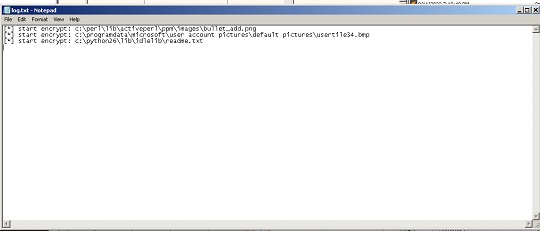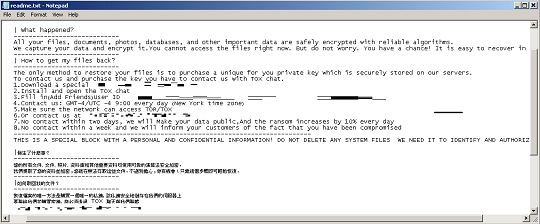Ransom.Win64.ARCRYPT.YJEIT
Windows


Threat Type: Ransomware
Destructiveness: No
Encrypted:
In the wild: Yes
OVERVIEW
Downloaded from the Internet, Dropped by other malware
This Ransomware arrives on a system as a file dropped by other malware or as a file downloaded unknowingly by users when visiting malicious sites.
It does not have any propagation routine.
It does not have any backdoor routine.
It does not have any information-stealing capability.
It encrypts files with specific file extensions. It drops files as ransom note.
TECHNICAL DETAILS
3,217,920 bytes
EXE
No
24 Sep 2024
Disables AV, Drops files, Encrypts files, Terminates processes
Arrival Details
This Ransomware arrives on a system as a file dropped by other malware or as a file downloaded unknowingly by users when visiting malicious sites.
Installation
This Ransomware drops the following files:
- {malware filepath}\log.txt → contains the status of encryption, deleted afterwards

- %Desktop%\userfile.cdci
- %Desktop%\userfile1.cdci
Propagation
This Ransomware does not have any propagation routine.
Backdoor Routine
This Ransomware does not have any backdoor routine.
Rootkit Capabilities
This Ransomware does not have rootkit capabilities.
Process Termination
This Ransomware terminates the following services if found on the affected system:
- vss
- wbengine
- MongoDB
- SQLWriter
- MSSQLServerOLAPService
- MSSQLSERVER
- MSSQLFDLauncher
- MSSQLSQLEXPRESS
- MSSQL$ERASQL
- SQLSERVERAGENT
- ReportServer
- OracleServiceORCL
- OracleRemExecService
- OracleVssWriterORAFPC
- OracleServiceORAFPC
- Oracle Object Service
- OracleASMService+ASM2
- OracleMTSRecoveryService
- OracleOHService
- OracleOraCrs11g_home1TNSListener
- OracleOraCrs11g_home1TNSListenerLISTENER_SCAN1
- OracleJobSchedulerORAFPC
- OracleServiceSYS12
- OracleServiceZAC12
- postgresql-x64-13
- AssetViewCore
- AssetViewDBService
- AssetViewFileTransferService
- SQLBrowser
- OracleDBConsoleorcl
- OracleVssWriterORCL
- MySQL
- ASLogWatch
- CAARCUpdateSvc
- CASAD2DWebSvc
- CASDiscovery
- CASUniversalAgent
- HpePqiESrv
- Standby Express zac1
- Standby Express zac1 Agent
It terminates the following processes if found running in the affected system's memory:
- sql.exe
- dbsnmp.exe
- isqlplussvc.exe
- xfssvccon.exe
- mydesktopservice.exe
- ocautoupds.exe
- encsvc.exe
- tbirdconfig.exe
- mydesktopqos.exe
- ocomm.exe
- dbeng50.exe
- sqbcoreservice.exe
- excel.exe
- infopath.exe
- msaccess.exe
- mspub.exe
- onenote.exe
- outlook.exe
- powerpnt.exe
- thebat.exe
- thunderbird.exe
- visio.exe
- winword.exe
- wordpad.exe
- sqlwriter.exe
- oracle.exe
- ocssd.exe
- mysqld.exe
- mysqld-nt.exe
- mysqld-opt.exe
- sqlbrowser.exe
- sqlagent.exe
- msftesql.exe
- sqlservr.exe
- notepad.exe
Information Theft
This Ransomware does not have any information-stealing capability.
Other Details
This Ransomware does the following:
- It requires to be executed with the password/passphrase in order to proceed with its malicious routine:
- 3456qwer
- It requires to be executed as an administrator.
- It clears the event logs of the affected system.
- It encrypts local, removable, and network drives.
- It encrypts the recycle bin of the affected system.
It does not exploit any vulnerability.
Ransomware Routine
This Ransomware encrypts files with the following extensions:
- .xlsx
- .xlsm
- .odt
- .ost
- .ppt
- .pptm
- .ppsm
- .pptx
- .sldm
- .csv
- .dwg
- .dxf
- .dws
- .fcs
- .analysis
- .comp
- .compensation
- .vmdk
- .pst
- .msg
- .eml
- .wab
- .mdf
- .ldf
- .myd
- .dbf
- .pgsql
- .sql
- .sqlite
- .db
- .sqlite3
- .db2
- .cql
- .rdb
- .ova
- .vmdk
- .vmsd
- .vmx
- .vswp
- .WALLET
- .CLASS
- .INCPAS
- .ACCDR
- .ACCDT
- .ACCDE
- .D3DBSP
- .BACKUPDB
- .BACKUP
- .IBANK
- .PKPASS
- .MDDATA
- .MDBACKUP
- .vmem
- .hvd
- .vhdx
- .gdb
- .cbk
- .SYNCDB
- .LAYOUT
- .DAZIP
- .ARCH00
- .VPP_PC
- .MCMETA
- .MPQGE
- .LITEMOD
- .ASSET
- .FORGE
- .RGSS3A
- .WOTREPLAY
- .MRWREF
- .dmp
- .dump
- .rtf
- .nst
- .trx
- .cs
- .rpt
- .BLEND
- .DESIGN
- .YCBCRA
- .SQLITEDB
- .SAS7BDAT
- .PSAFE3
- .ERBSQL
- .DB-JOURNAL
- .MONEYWELL
- .vib
- .vbk
- .vbm
- .bak
- .trn
- .rdl
- .edb
- .config
- .ev
- .evtmp
- .ldb
- .mod
- .mkv
- .dat
- .ai
- .cab
- .mdbx
- .bkf
- .arc
- .srv
- .bkp
It avoids encrypting files found in the following folders:
- Program Files
- Program Files (x86)
- Windows
- AppData
It renames encrypted files using the following names:
- {19 random numbers}.SCBIN
It drops the following file(s) as ransom note:
- %Desktop%\readme.txt

SOLUTION
9.800
19.602.04
20 Sep 2024
19.603.00
21 Sep 2024
Step 1
Before doing any scans, Windows 7, Windows 8, Windows 8.1, and Windows 10 users must disable System Restore to allow full scanning of their computers.
Step 2
Note that not all files, folders, and registry keys and entries are installed on your computer during this malware's/spyware's/grayware's execution. This may be due to incomplete installation or other operating system conditions. If you do not find the same files/folders/registry information, please proceed to the next step.
Step 3
Search and delete this file
- {malware filepath}\log.txt
- %Desktop%\userfile.cdci
- %Desktop%\userfile1.cdci
- %Desktop%\readme.txt
Step 4
Scan your computer with your Trend Micro product to delete files detected as Ransom.Win64.ARCRYPT.YJEIT. If the detected files have already been cleaned, deleted, or quarantined by your Trend Micro product, no further step is required. You may opt to simply delete the quarantined files. Please check the following Trend Micro Support pages for more information:
Step 5
Restore encrypted files from backup.
Did this description help? Tell us how we did.

